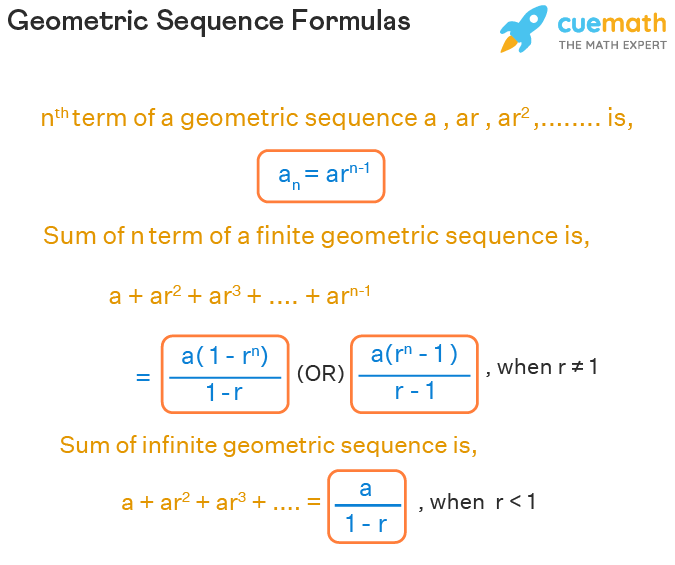Geometric Sequence Formulas
The geometric sequence formulas include multiple formulas related to a geometric sequence. Before learning these formulas, let us recall what is a geometric sequence. It is a sequence of numbers in which the ratio of every two consecutive numbers is always a constant. For example, 2, 4, 8, 16, ... is a geometric sequence as the common ratio of every two consecutive terms here is 2, i.e., common ratio = 4/2 = 8/4 = 16/8 = ... = 2. Let us learn the geometric sequence formulas in detail along with a few solved examples here.
What Are Geometric Sequence Formulas?
The geometric sequence formulas include the formulas for finding its nth term and the sum of its n terms. We can also find the sum of infinite terms of a geometric sequence when its common ratio is less than 1. We will see the geometric sequence formulas related to a geometric sequence with its first term 'a' and common ratio 'r' (i.e., the geometric sequence is of form a, ar, ar2, ar3, ....). Here are the geometric sequence formulas.

Let us see each of these formulas in detail.
nth Term of Geometric Sequence Formula
We have considered the sequence to be a, ar, ar2, ar3, .... . Its first term is a (or ar1-1), its second term is ar (or ar2-1), its third term is ar2 (or ar3-1). Thus,
The nth term of the geometric sequence is, an = a · rn - 1.
Sum of n Terms of Geometric Sequence Formula
Then sum of its first 'n' terms of the geometric sequence a, ar, ar2, ar3, .... is,
Sn = a + ar + ar2 + ... + arn-1 ... (1)
Multiplying both sides by 'r',
rSn = ar + ar2 + ... + arn ... (2)
Subtracting the equation (2) from equation (1),
Sn - r Sn = a - arn
Sn (1 - r) = a (1 - rn)
Dividing both sides by (1 - r),
Sn = a (1 - rn) / (1 - r)
Similarly we can derive the other formula (Sn = a (rn - 1) / (r - 1). Thus,
The sum of the first 'n' terms of the geometric sequence is,
Sn = a (1 - rn) / (1 - r), when |r| < 1
[OR]
Sn = a (rn - 1) / (r - 1), when r > 1 (or) when r < -1
Sum of Infinite Geometric Sequence Formula
Sometimes, we may need to find the sum of an infinite geometric sequence when the absolute value of the common ratio is less than 1. The sum of infinite geometric sequence a, ar, ar2, ar3, .... is, S∞ = a / (1 - r).
Note that this formula can only be applied when |r| < 1. When r > 1, the infinite geometric sequence diverges (i.e., we cannot find its sum).
Note: Here, r = the ratio of any two consecutive terms = an/an-1.

In the next section, we will see the applications of the geometric sequence formulas.
Examples Using Geometric Sequence Formulas
Example 1: Find the 10th term of the geometric sequence 1, 3, 9, 27, .....
Solution:
In the given geometric sequence,
The first term is, a = 1.
The common ratio is, r = 3/1 = 9/3 = 27/9 = ... = 3.
Using the geometric sequence formula, the nth term of a geometric sequence is,
an = a · rn - 1
To find the 10th term, we substitute n = 10 in the above formula. Then we get:
a10 = 1 (3)10 - 1 = 39 = 19683
Answer: The 10th term of the given geometric sequence = 19,683.
Example 2: Find the sum of the first 15 terms of the geometric sequence 1, 1/2, 1/4, 1/8, .... Round your answer to 5 decimals.
Solution:
In the given geometric sequence,
The first term is, a = 1.
The common ratio is, r = (1/2) / 1 = (1/4) / (1/2) = (1/8) / (1/4) = ... = 1/2.
Note that here |r| < 1.
Using the geometric sequence formulas, the sum of n terms of a geometric sequence when |r| < 1 is,
Sn = a (1 - rn) / (1 - r)
To find the sum of first 15 terms, substitute n = 15 on both sides.
S_{15} = 1 (1 - (1/2)15) / (1 - (1/2)) ≈ 1.99994
Answer: The sum of the first 15 terms of the given geometric sequence (rounded to 5 decimals) is 1.99994.
Example 3: Find the sum of the infinite geometric sequence 1, 1/4, 1/16, 1/64, ...
Solution:
In the given geometric sequence,
The first term is, a = 1.
The common ratio is, r = (1/4) / 1 = (1/16) / (1/4) = (1/64) / (1/16) = ... = 1/4.
Note that here |r| < 1.
Using the geometric sequence formulas, the sum of an infinite geometric sequence is,
S_\infty = a / (1 - r)
S_\infty = 1 / (1 - (1/4))
= 1 / (3/4)
= 4/3.
Answer: The sum of the given infinite geometric sequence is 4/3.
FAQs on Geometric Sequence Formulas
What Are Geometric Sequence Formulas?
A geometric sequence is a sequence of terms (or numbers) where all ratios of every two consecutive terms give the same value (which is called the common ratio). Considering a geometric sequence whose first term is 'a' and whose common ratio is 'r', the geometric sequence formulas are:
- The nth term of geometric sequence = a rn-1.
- The sum of first 'n' terms of geometric sequence is:
a (1 - rn) / (1 - r), when |r| < 1
[OR]
a (rn - 1) / (r - 1), when r > 1 (or) when r < -1 - The sum of infinite geometric sequence = a / (1 - r).
How To Derive the Sum of Geometric Sequence Formula?
Consider a geometric sequence with first term 'a' and common ratio 'r'. Then sum of its first 'n' terms is, Sn = a + ar + ar2 + ... + arn-1. To derive the sum of geometric sequence formula, we will first multiply this equation by 'r' on both sides and the subtract the above equation from the resultant equation. Then we will solve for Sn. For detailed proof, you can refer to "What Are Geometric Sequence Formulas?" section of this page.
What Are the Applications of Geometric Sequence Formulas?
The geometric sequence formulas have many applications in many fields such as physics, biology, engineering, also in daily life. Consider the following example.
For example, the population of fishes in a pond every day is exactly half of the population on the previous day. If the pond starts with 1216 fishes, what would be the population on the 5th day?
In this case, the first term is, a = 1216 and the common ratio is, r = 1/2 (because the fishes become half on every day). To find the population of fishes on 5th day, we have to substitute n = 5 in the nth term of the geometric sequence formula. Then we get: an = a · rn - 1
a_5 = 1216 · (1/2)5 - 1 = 76.
Thus, the number of fishes on 5th day = 76.
How To Use the Sum of Geometric Sequence Formula for Infinite Geometric Sequences?
The sum of infinite terms of a geometric sequence whose first term is 'a' and common ratio is 'r' is, a / (1 - r). We can find the values of 'a' and 'r' using the geometric sequence and substitute in this formula to find the sum of the given infinite geometric sequence.
For example, Let us find the sum of all terms of the geometric sequence 1/4, 1/8, 1/16, ... Here, a = the first term = 1/4 and the common ratio, r = (1/8) / (1/4) = 1/2. Then the sum of all (infinite) terms of the given geometric sequence is, a / (1 - r) = (1/4) / (1 - 1/2) = 1/2.
visual curriculum
